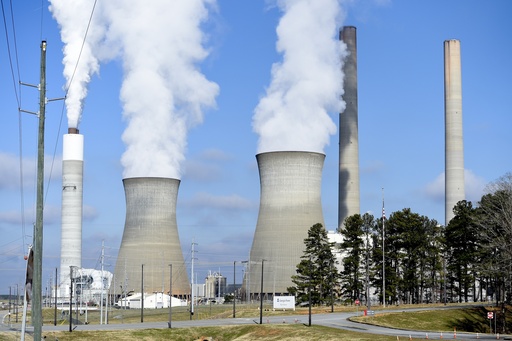
ATLANTA — Georgia Power Co. has announced its intention to continue using coal to address the anticipated increase in electricity demand within the state. The utility, which is Georgia’s only private electrical provider, forecasts a substantial rise in electrical needs, attributing much of the surge to energy-intensive data centers. This situation exemplifies the growing strain on the electrical infrastructure across the United States, simultaneously complicating efforts to reduce carbon dioxide emissions which contribute to climate change.
Recently, Georgia Power submitted a necessary plan to regulators outlining its future strategies for power generation and transmission. The Georgia Public Service Commission, comprised of five elected Republican members, is set to conduct hearings and vote on the proposed plan. Afterward, Georgia Power will present a rate proposal for the investments planned over the next three years, with commissioners likely to decide on the rates in December. However, the company has not disclosed any potential costs or how these may affect consumers’ bills.
The impact of potential bill increases could hold significant weight, especially with two of the commissioners, Tim Echols and Fitz Johnson, facing reelection in November. Their elections, occurring in an uncommon year, stem from a previous legal dispute regarding the statewide election process for commissioners.
As it stands, the average residential customer of Georgia Power is billed approximately $163.57 monthly, excluding taxes. This amount has surged due to rising natural gas prices and the expenses tied to the construction of two new nuclear reactors at Plant Vogtle, resulting in bill increases that have surpassed inflation. In 2019, the typical monthly charge was just $123.31.
In the integrated resource plan submitted, Georgia Power has raised its demand forecast by 2,000 megawatts annually going forward, an amount nearly equivalent to the expected yearly output of both new nuclear reactors at Plant Vogtle. The overall requirement indicates a need for an additional 8,000 megawatts of generation per year in the near term.
“The 2025 integrated resource plan offers a detailed approach to support the continued economic growth of Georgia, ensuring the provision of clean, safe, reliable, and affordable energy for Georgians in the years to come,” stated Kim Greene, CEO of Georgia Power.
However, the company’s continued reliance on coal and the associated carbon dioxide emissions has raised concerns among critics, who argue that this decision represents an expensive and outdated energy strategy. Jennifer Whitfield, an attorney with the Southern Environmental Law Center, expressed skepticism about the reliance on fossil fuels. She remarked, “Georgia leads as a premier business destination and is one of the fastest-growing tech regions in the U.S. Are we truly going to fuel our advancement with gas and coal? Coal has been economically unviable for years, and depending on more methane gas contradicts the aspirations of Georgians and the demands of businesses.”
Georgia Power has revised its timeline regarding the operation of a coal-burning unit at Plant Scherer, now planning to keep it functional until 2035 or 2038, instead of shutting it down in 2028. The timeline for Plant Bowen, a notable coal plant located northwest of Atlanta in Euharlee, remains undetermined, but a similar operational extension is anticipated until 2035 or 2038. The utility also aims to continue operations at Plant Gaston in Alabama, which it co-owns with Alabama Power, until 2034 rather than closing it down in 2028. While it mainly runs on natural gas, some coal is still utilized.
To mitigate emissions somewhat, Georgia Power has proposed a dual-fuel strategy that involves burning natural gas alongside coal at both Plant Scherer and Plant Bowen. Additionally, the plan includes modifications aimed at enhancing the production capacity of its Vogtle and Hatch nuclear facilities without the construction of new reactors, as well as increasing throughput at Plant McIntosh, a natural gas plant near Savannah.
Furthermore, Georgia Power intends to invite external developers to submit bids for the establishment of solar panel and battery storage systems capable of generating 1,100 megawatts. Though this figure pales in comparison to the output that would result from maintaining coal operations, it marks a step towards diversifying energy sources.
Lastly, Georgia Power wishes to initiate a program allowing smaller customers to install solar systems and battery storage in their residences. These customers could earn bill credits if they permit the utility to utilize their generated electricity during peak demand periods.

